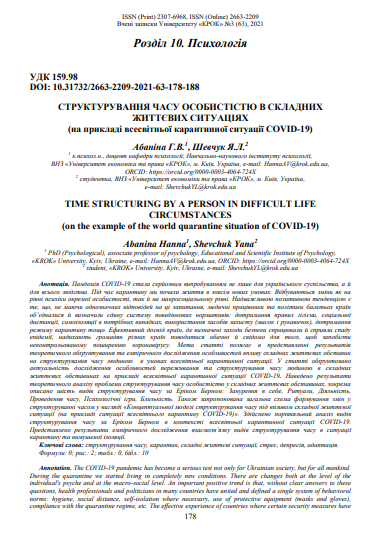TIME STRUCTURING BY A PERSON IN DIFFICULT LIFE CIRCUMSTANCES (on the example of the world quarantine situation of COVID-19)
DOI:
https://doi.org/10.31732/2663-2209-2021-63-178-188Keywords:
time structuring, quarantine, difficult life situations, stress, depression, adaptationAbstract
The COVID-19 pandemic has become a serious test not only for Ukrainian society, but for all mankind. During the quarantine we started living in completely new conditions. There are changes both at the level of the individual's psyche and at the macro-social level. An important positive trend is that, without clear answers to these questions, health professionals and politicians in many countries have united and defined a single system of behavioral norms: hygiene, social distance, self-isolation where necessary, use of protective equipment (masks and gloves), compliance with the quarantine regime, etc. The effective experience of countries where certain security measures have worked and contributed to the decline of the epidemic inspires citizens of different countries to act cautiously and consciously to prevent the uncontrolled spread of the coronavirus. The purpose of the article is to present the results of theoretical substantiation and empirical study of the impact of complex life circumstances on the structuring of human time in a global quarantine situation. The article substantiates the relevance of the study of the peculiarities of experiencing and Time structuring by a person in difficult life circumstances on the example of the world quarantine situation of COVID-19. The results of theoretical analysis of the problem of time structuring by a person in difficult life circumstances are presented, in particular, six types of time structuring according to Eric Berne are described: Withdrawal, Rituals, Activities, Pastimes, Psychological games, Intimacy. A general scheme for the formation of changes in time structuring in the form of a Conceptual Model of time structuring under the influence of a difficult life situation (on an example of a situation of world quarantine COVID-19) is also proposed. A comparative analysis of the types of time structuring according to Eric Bern in the context of the world quarantine situation of COVID-19 is carried out. The results of an empirical study of the relationship between the types of time structuring in a situation of quarantine and forced isolation are presented.
Downloads
References
The psychological impact of quarantine and how to reduce it: rapid review of the evidence. Published :February 26, 2020. URL : https://www.thelancet.com/journals/lancet/article/PIIS0140-6736(20)30460-8/fulltext.
Een analyse van de jobkwaliteit in België in 2015. Gepubliceerd op 09 januari 2017. URL : https://werk.belgie.be/nl/nieuws/een-analyse-van-de-jobkwaliteit-belgie-2015?id=45604.
Болотова А. К. Психологія організації часу: навчальний посібник для студентів вузів. Москва : Аспект Пресс, 2006. 254 с.
Eric Berne. Transactional Analysis in Psychotherapy /Grove Press. Inc., New York. 1994. 224 p.
Абаніна Г. В. Темпоральні виміри інтернет-реальності. Науково-практичний семінар «Психологічні та педагогічні проблеми інтернет-реальності». Інститут соціальної та політичної психології НАПН України. м. Київ-2012. URL : http://www.ispp.org.ua/backup_ispp/podiy_37.htm.
Репортаж на каналі ТСН. URL : https://tsn.ua/coronavirus/derzhavniy-feyk-pid-chas-karantinu-u-moz-ziznalisya-scho-z-tochki-zoru-epidemiologiyi-zakrivati-parki-ne-bulo-potrebi-1543866.html?fbclid=IwAR0RNksSKSF_fYMudCBbqt_2Hp7QJFfTAqhG7neGCQWEKmJPDKpmNkOynfI.
Leahy R. L. Coronavirus Anxiety. How to handle fear while pursuing safety. Psychology Today. 2020. URL : https://www.psychologytoday.com/us/blog/anxiety-files/202003/coronavi-rus-anxiety.
Вассерман Л. И., Абабков В. А., Трифонова Е. А. Совладание со стрессом: теория и психодіагностика. СПб.: Речь, 2010. 192 с.
Зливков В. Л., Лукомська С. О., Федан О. В. Психодіагностика особистості у кризових життєвих ситуаціях. Київ : Педагогічна думка, 2016. 219 с.
Мироненко Г. В. Час віртуального життя : монографія / Національна академія педагогічних наук України, Інститут соціальної та політичної психології. Київ : Імекс-ЛТД, 2015. 134 с.



